Prof. Dr. Elena Giannoulis
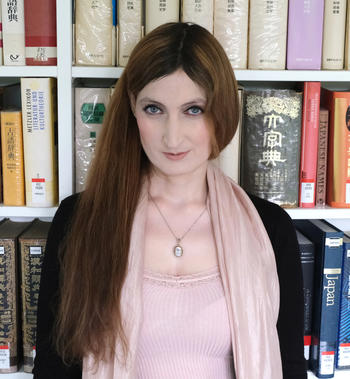
Institute of Japanese Studies
Professor
Room 1.15
14195 Berlin
Office hours
Summer term 2024:
Only by appointment, via WebEx, every Friday from 12:00–1:00 p.m.
Curriculum Vitae
EDUCATION
| 2009 |
PhD Japanese Studies, Faculty of History and Cultural Studies, Freie Universität Berlin, Germany |
| 2007 |
Studies in Japanese Studies, German Literature, Comparative Literature and Religious Studies; Master's degree in Japanese Studies (Major) and German Literature (Second Major), Freie Universität Berlin, Germany |
| 2001–2003 |
BA (Zwischenprüfung), in Japanese Studies (Major) and Modern Germany Literature (Second Major), Freie Universität Berlin, Germany |
CURRENT POSITION(S)
| 2017– |
Principal Investigator (PI) of the ERC research project Emotional Machines: The Technological Transformation of Intimacy in Japan (EMTECH) |
| 2017 |
Visiting Researcher, Department of Literature, University of Tokyo, Japan |
| 2015 | Visiting Researcher, Department of Literature, University of Tokyo, Japan |
| 2014–2015 |
Visiting Researcher, Department of Asian Languages and Cultures, Rutgers, State University of New Jersey, USA |
| 2013– |
Junior Professor for Japanese Literature, Friedrich Schlegel Graduate School of Literary Studies, Freie Universität Berlin, Germany |
| 2010–2012 | Post-Doctoral Fellow, “Languages of Emotion” Cluster of Excellence, Freie Universität Berlin, Germany |
| 2008–2013 | Research Fellow in Japanese Studies, Institute of East Asian Studies, Freie Universität Berlin, Germany |
| 2005–2007 | Researcher, Nihon Keizai Newspaper, Federal Press House Berlin, Germany |
| 2003–2004 | Research Student, Department of Japanese Literature, Keio University, Japan |
| 2002–2003 |
Researcher and Editor, Asahi Newspaper, DahlemerPublishing, Freie Universität Berlin, Germany |
FELLOWSHIPS AND AWARDS
| 2016 |
European Research Council (ERC) Starting Grant: |
| 2015 | Starting Grant for Assistant Professors, Freie Universität Berlin, Germany |
| 2012 |
Post-doctoral Fellowship in the Humanities, Rutgers University, Volkswagen Foundation, Germany |
| 2009 |
JaDe Foundation grant, Germany |
| 2003–2004 | Exchange Service study abroad fellowship, Germany |
| 1998 |
Scholarship for overseas study (Tamagawa Gakuen Kotobu), Japan |
SUPERVISION OF GRADUATE STUDENTS AND (POST)DOCTORAL FELLOWS
| 2012–2024 | 3 PhD Students (co-supervisor), >100 MA and BA students (supervisor) Institute for Japanese Studies and Friedrich-Schlegel Graduate School, Freie Universität Berlin, Germany |
ORGANIZATION OF SCIENTIFIC MEETINGS
| 2022 | Conference organizer, Narrating Emotional Closeness between Humans and Machines in Japanese (Popular) Culture and Literature, Freie Universität Berlin, Germany |
| 2020 | Conference organizer, Desired Identities: New Technology-based Metamorphosis in Japan, in cooperation with the Département de la Recherche et de l’Enseignement du musée du quai Branly – Jacques Chirac, Paris |
| 2019 | Conference organizer, Emotional Attachment to Machines – New Ways of Relationship-Building in Japan, Freie Universität Berlin, Germany |
| Workshop organizer, Affective Responses to New Technologies, Freie Universität Berlin, Germany | |
| 2016 | Conference organizer, Emoticons, Emoji and Kaomoji: The Transformation of Communication in the Digital Age, Freie Universität Berlin, Germany |
| Workshop organizer, Transgressive Writing - Two Unorthodox Authors from Tokyo, Friedrich Schlegel Graduiertenschule/ Freie Universität Berlin, Germany | |
| 2015 | Workshop organizer, Exploring Space in Japanese Literature, Freie Universität Berlin, Germany |
| 2012 | Conference co-organizer, Self-Narratives in Japanese Studies: Literature and History, Freie Universität Berlin, Germany |
| 2011 | Conference co-organizer, MISHIMA! Worldwide impact and Multi-Cultural Roots, Japanese-German Center Berlin, Germany |
| 2010 | Conference co-organizer, Coolness: Multidisciplinary Perspectives, Freie Universität Berlin/Languages of Emotion, Germany |
| 2009 | Workshop co-organizer, Food and Gender in Japan, Freie Universität Berlin, Germany |
INSTITUTIONAL RESPONSIBILITIES
| 2015– | Deputy Master and Bachelor Representative, Freie Universität Berlin, Germany |
| 2015 | PhD-committee member (Dr. Oliver Hartmann), Freie Universität Berlin, Germany |
| 2014– |
Work-group leader, “Contemporary Japanese Literature,” Freie Universität Berlin, Germany |
| 2014 | Appointment committee member, Prof. Urs Matthias Zachmann, Freie Universität Berlin, Germany |
| 2013 | Habilitation committee member, Prof. Susanne Klien, Freie Universität Berlin, Germany |
| 2013 | Doctoral and Postdoctoral search committee member, Friedrich Schlegel Graduate School of Literary Studies, Freie Universität Berlin, Germany |
| 2011–2012 |
DFG-research group member “Self-narratives in Transnational Perspective”, Freie Universität Berlin, Germany |
| 2011 | Professional Skills Representative, East Asian Seminar, Freie Universität Berlin, Germany |
| 2011 | Honour Doctorial Committee member, Prof. Mishima Ken’ichi, Freie Universität Berlin, Germany |
| 2011 | PhD-committee member (Dr. Rebecca Mak), Freie Universität Berlin, Germany |
| 2009/2011 | Organizer, “Long Night of the Sciences” (Lange Nacht der Wissenschaften), Freie Universität Berlin, Germany |
| 2009 | Extraordinary professorship committee member, Prof. Matthew Königsberg, Freie Universität Berlin, Germany |
| 2008– | Student fellowship for Japan study committee member, Freie Universität Berlin, Germany |
| 2008– | Faculty search committee, Freie Universität Berlin, Germany |
COMMISSIONS OF TRUST
| 2014–present | Review Board for the Journal Bunron (Literary Theory), Ruprecht Karls Universität Heidelberg, Germany |
| 2015–present | Review Board for German Academic Exchange Service (DAAD), Germany |
| 2011 | Reviewer for Suhrkamp Publisher, Germany |
MEMBERSHIPS OF SCIENTIFIC SOCIETIES
| German Association for Research on Japan (Deutsche Gesellschaft für Japanforschung) (GJF) |
| European Association of Japanese Studies (EAJS) |
|
Association for Asian Studies (AAS) |
|
Japanese Society for German Studies (JGG) |
|
German-Japanese Society (Deutsch-Japanische Gesellschaft) (DJG) |
|
Deutscher Hochschulverband (DHV) |
Invited Presentations and Panels (selection)
|
2024 |
|
|
2023 |
|
|
2022 |
|
|
2019 |
|
|
2017 |
|
|
2016 |
|
|
2015 |
|
|
2014 |
|
|
2013 |
|
|
2012 |
“Playing with Authenticity: Functions and Effects of Contemporary Shishōsetsu,” Workshop, “Self-Narratives in Japanese Studies – Literature and History,” Freie Universität Berlin. |
|
2011 |
“Nihon ni okeru kūrunesu (The Concept of Coolness in Japan),” Workshop, “Bunka no eikkyō to honyaku (Cultural Influence and Translation),” Border-Crossing of Culture and Translation, Europa-Center Nagoya University, Freiburg. |
|
2010 |
|
|
2009 |
|
| 2008 |
|
| 2008-present |
PhD courses: Research Design for Cultural Studies and Literary Studies (with Cordula Lemke); Research Colloquium MA courses: Nostalgia/natsukashisa in Japanese Culture and Literature, Robots and other Emotional Machines in Japan; Emoji, Emoticons and Kaiomoji in Japanese Literature, Culture and Communication; The Literary Market in Japan; Heterotopia and Non-Places in Japanese Literature; Theories and Discourses in Cultural Studies/Sociology and Literary Studies BA courses: Emotional Management: Cultural and Literary Shaping of Emotions; Facets of “Coolness” in Japanese Culture and Literature; Emotions in Japanese Literature and Culture; Sex, Drugs and Violence? – Recent Literature of Japanese Female Writers; Introduction to Japanese Culture and Literature (premodern to present); Introduction to Japanese Cultural and Literary History (premodern to present) |
Courses 2023/24
Seminar „Der Ausstieg als Fiktion - Disconnection in der japanischen Literatur und Kultur“
Übung „Der Ausstieg als Fiktion - Disconnection in der japanischen Literatur und Kultur“
Past Courses
SoSe 2023
Colloquium „Abschlusscolloquium Kultur und Geschichte“
Übung „Methoden und Arbeitstechniken der Kultur-, Geschichts- und Literaturwissenschaften“
WiSe 2022/23
Seminar „Das Unheimliche, Morbide und Verstörende in der Literatur von Ogawa Yoko“
Übung „Das Unheimliche, Morbide und Verstörende in der Literatur von Ogawa Yoko“
SoSe 2022
Proseminar „Der Literarische Markt in Japan und japanische Literatur auf dem deutschen Literaturmarkt“
Übung „Methoden und Arbeitstechniken der Kultur-, Geschichts- und Literaturwissenschaften“
WiSe 2021/22
Seminar „Gefühlvolle Maschinen? Aktuelle kulturelle und literarische Leitbilder künstlicher Intelligenz in Japan“
Übung „Gefühlvolle Maschinen? Aktuelle kulturelle und literarische Leitbilder künstlicher Intelligenz in Japan
SoSe 2021
Übung „Methoden und Arbeitstechniken der Kultur-, Geschichts- und Literaturwissenschaften“
Colloquium „Abschlusscolloquium Kultur und Geschichte“
WiSe 2020/21
Seminar „Der literarische Markt in Japan“
Übung „Der literarische Markt in Japan“
SoSe 2020
Seminar „Theorie und Praxis des Übersetzens Japanisch–Deutsch–Japanisch“
Übung „Theorie und Praxis des Übersetzens Japanisch–Deutsch–Japanisch“
WiSe 2019/20
Proseminar „Emotionen in der japanischen Kultur und Literatur“
SoSe 2019
Seminar „Theorie und Praxis des Übersetzens Japanisch–Deutsch–Japanisch“
Übung „Theorie und Praxis des Übersetzens Japanisch–Deutsch–Japanisch“
WiSe 2018/19
Seminar „Theorie und Praxis des Übersetzens Japanisch–Deutsch–Japanisch“
Übung „Theorie und Praxis des Übersetzens Japanisch–Deutsch–Japanisch“
SoSe 2018
Übung „Methoden und Arbeitstechniken der Literatur- und Kulturwissenschaften“
Colloquium „Kultur- und literaturwissenschaftliches Abschlusscolloquium“
WiSe 2017/18
Vertiefungsvorlesung „Theorien und Diskurse der literatur- und kulturwissenschaftlichen Japanologie“
Seminar „Forschungscolloquium für das 2. Studienjahr“ (mit Prof. Dr. Irmela Marei Krüger-Fürhoff) (Doktorandenseminar)
SoSe 2017
14010/11 Vom Unbehagen an der Gegenwart - Nostalgie in der japanischen Literatur und Kultur
14020 Methoden und Arbeitstechniken der Literatur- und Kulturwissenschaften
14030 Kultur- und literaturwissenschaftliches Abschlusscolloquium
WiSe 2016/17
14020 Theorien und Diskurse der literatur- und kulturwissenschaftlichen Japanologie
SoSe 2016
14024/14025 Emoji, Emoticons und Kaomoji in japanischer Literatur, Kultur und Kommunikation
WiSe 2015/16
14022/14023 Der literarische Markt in Japan
SoSe 2015
14006/14007 - Heterotopien und Nicht-Orte in der Japanischen Literatur
SoSe 14
14000a - Einführung in die Kultur und Literatur Japans
14000b - Einführung in die Kultur und Literatur Japans
16585 - Literatur in transnationaler Perspektive (Friedrich Schlegel Graduiertenschule für literaturwissenschaftliche Studien)
WiSe 2013/14
14022 - Ästhetik der Macht und des Begehrens in der Literatur von Tanizaki Jun'ichirô
14023 - Tanizaki Jun'ichirô
SoSe 2013
14000a - Einführung in die Kultur und Literatur Japans
14000b - Einführung in die Kultur und Literatur Japans
WiSe 2012/13
14013 - Emotionsmanagement - Kulturelle und literarische Modellierungen von Gefühlen in Japan
14020 - Theorien und Diskurse der kulturwissenschaftlichen Japanologie
SoSe 2012
Vorlesung „Theorien und Diskurse“ (im Masterstudiengang)
WiSe 2011/12
Proseminar „Facetten der ‚Coolness‘ in der japanischen Literatur und Kultur
SoSe 2011
Einführungskurs „Einführung in die Kultur und Literatur Japans“
WiSe 2010/11
Proseminar „Emotionen in der japanischen Literatur und Kultur“
SoSe 2010
Einführungskurs „Einführung in die japanische Kultur- und Literaturgeschichte" (Japankunde II)
WiSe 2009/10
Einführungskurs „Einführung in die japanische Kultur- und Literaturgeschichte“ (Japankunde I)
SoSe 2009
Proseminar „Blut als Tinte – Zeitgenössisches autobiographisches Schreiben in Japan“
WiSe 2008/09
Proseminar „Sex, drugs and violence? - Aktuelle Literatur japanischer Gegenwartsautorinnen"
SoSe 2008
Einführungskurs „Einführung in die japanische Kultur- und Literaturgeschichte“ (Japankunde I)
Focus areas
Modern and contemporary Japanese literature and culture, affects and emotions, human-machine interaction, digital communication, The Affective Power of Weakness - From Yoshitsune to yowai robotto, Soft Japan, emoi and moe as well as forms of attachment and detachment (e.g. zetsuen 絶縁 'disconnection') in present-day Japanese society.
Principal Investigator (P.I.) of the ERC research project Emotional Machines: The Technological Transformation of Intimacy in Japan (EMTECH).
Publications
Books
Giannoulis, Elena (2024). Literarische Figuration von Gefühlen – Zum affektiven Erzählen bei Ogawa Yōko (Literary Figurations of Feelings – On Affective Writing in the Literature of Ogawa Yōko). (working title) (forthcoming)
Giannoulis, Elena; Wilde, Lukas R.A. (Eds.) (2019). Emoticons, Emoji and Kaomoji: The Transformation of Communication in the Digital Age. Routledge Research in Language and Communication. New York, London: Routledge.
![]()
Giannoulis, Elena (2018) (Ed.). Von Katzentötern, schwebenden Rauchern und der Suche nach Nilpferden. Kurzgeschichten aus Japan (Of Cat Killers, Floating Smokers and the Search for Hippos: Short Stories from Japan). With an afterword by Elena Giannoulis. Berlin: be.bra Verlag.
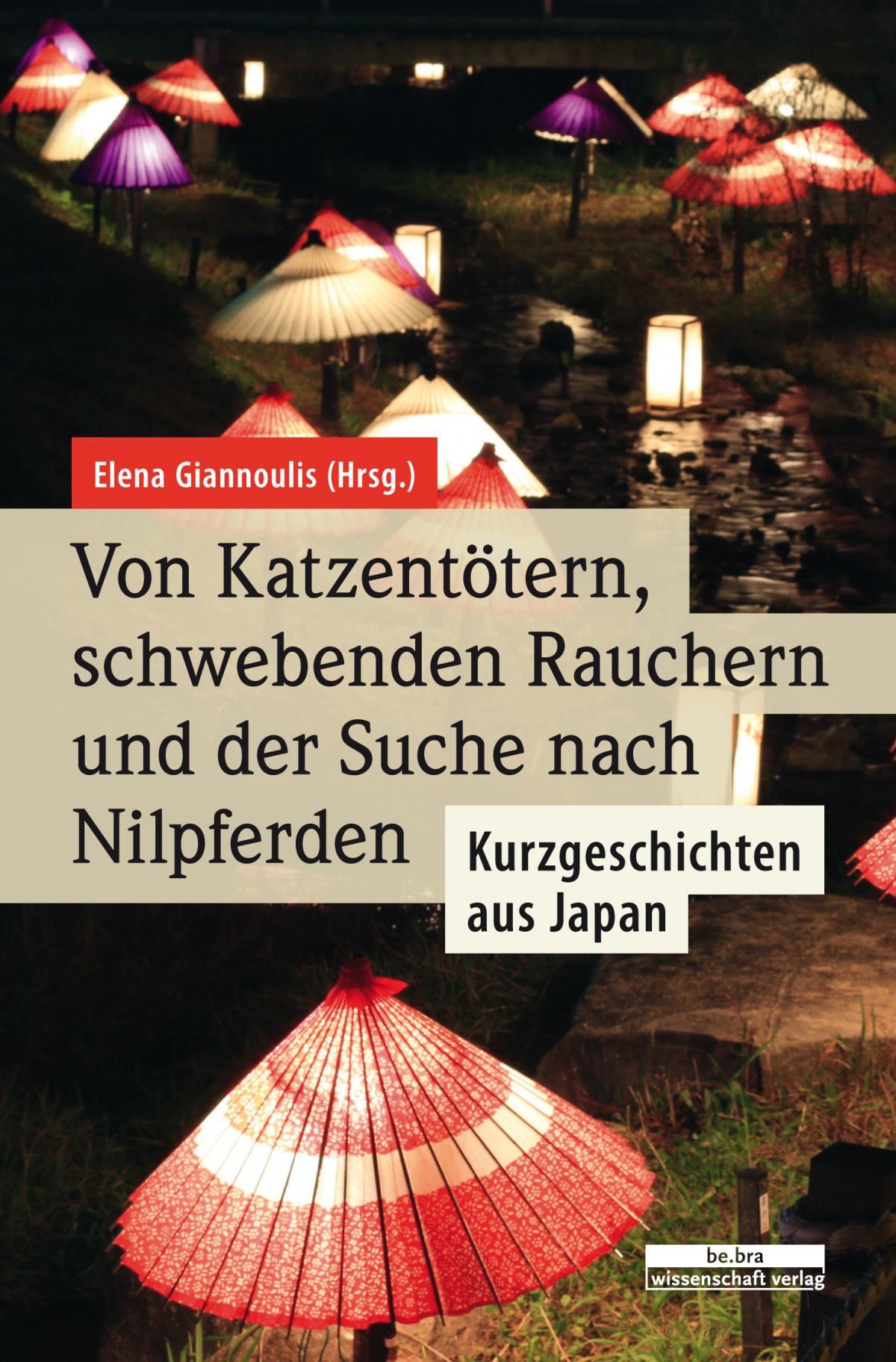
2013. The Cultural Career of Coolness. Discourses and Practices of Affect Control in European Antiquity, the United States, and Japan, edited by Elena Giannoulis, Irmela Hijiya-Kirschnereit, Ulla Haselstein, and Catrin Gersdorf. Lanham: Lexington.
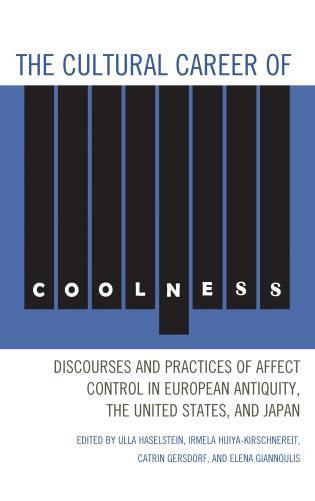
2010. Blut als Tinte: Wirkungs-und Funktionsmechanismen zeitgenössischer shishōsetsu (Blood as Ink: Mechanisms of Effects and Functions of Contemporary I-Novels). München: Iudicium. Vol. 22.
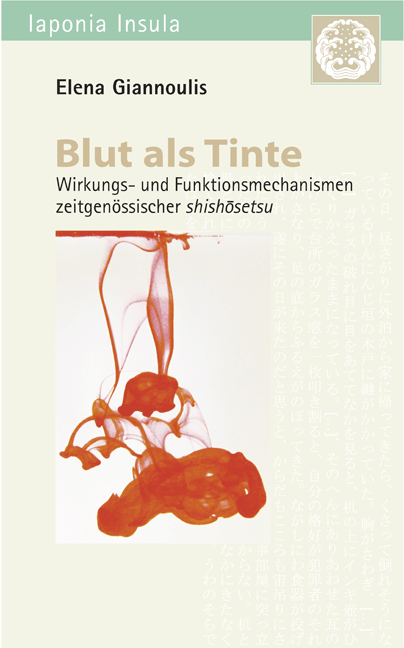
Translations
Giannoulis, Elena (2023). In: Tawada, Yoko & Poschmann, Marion (2023). Eine raffinierte Grenze aus Licht: Japanische Dichtung der Gegenwart. (A Sophisticated Boundary Made of Light: Contemporary Japanese Poetry). Mainzer Reihe, Neue Folge 20. Göttingen: Wallstein. (numerous poems).
2019. Hirano, Keiichirō. "Die verschwundenen Honigbienen". (The Missing Honeybees). Translated from the Japanese by Elena Giannoulis. In: Giannoulis, Elena (Ed.) (2019). Von Katzentötern, schwebenden Rauchern und der Suche nach Nilpferden. Kurzgeschichten aus Japan. Berlin: be.bra Verlag, pp. 7–26.
2019. Kawakami, Hiromi. "Der Fluss" (The River). Translated from the Japanese by Elena Giannoulis. In: Giannoulis, Elena (Ed.) (2019). Von Katzentötern, schwebenden Rauchern und der Suche nach Nilpferden. Kurzgeschichten aus Japan. Berlin: be.bra Verlag, pp. 33–37.
2012. Kometani, Fumiko. Wasabi zum Frühstück. Erzählungen: Aus dem Japanischen übersetzt und mit einem Nachwort versehen von Elena Giannoulis [Wasabi for Breakfast: Short Stories, Translated from the Japanese with an Afterword by Elena Giannoulis]. Berlin: be.bra Verlag (orig. Famirī Bijinesu [Family Business], 1998).
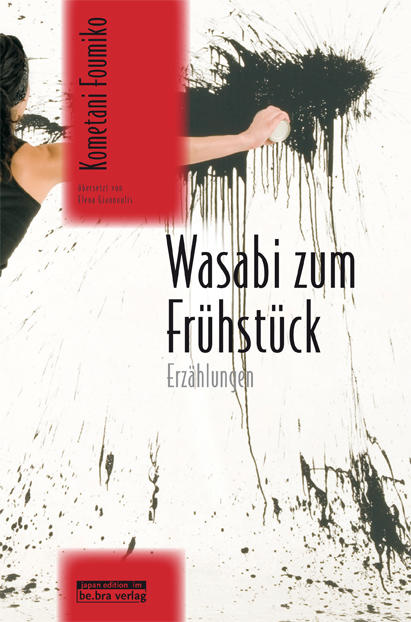
Articles (selection)
Giannoulis, Elena; Frommann, Berthold (2024). “Narratives of Intimate Human–Machine Relationships in Contemporary Japanese Popular Culture”. In: Giannoulis, Elena (Ed.): The Future of Humans and Emotional Machines: Narratives from Japanese Culture and Literature. (forthcoming)
Giannoulis, Elena (2024): “Die Leere als Monster der Stadt, der Tokyo-Tower als Grabstein der Erinnerungen: Entnetzungsversuche ins ‚Nichts‘”. (accepted)
Giannoulis, Elena (2024). “The Encoding of Emotions in Ogawa Yōko’s Works: Sensory Narration and Mood Tableaux”. In: Japanese Language and Literature. (accepted)
Giannoulis, Elena (2024): “Ogawa Yoko: Insel der verlorenen Erinnerung“. In: Arnold, Heinz Ludwig (Ed.): Kindlers Literatur Lexikon (KLL). Stuttgart: J.B. Metzler. https://doi.org/10.1007/978-3-476-05728-0_23378-1
Giannoulis, Elena (2023). “Ogawa Yōko no sakuhin ni okeru emōshon no kigōka to sono jōdō to kanjō sayō no kanōsei”. In: Gunzō 78(10), pp. 195–216.
Giannoulis, Elena (2023). “Die Kodierung von Emotionen in Ogawa Yōkos Werken und deren affektives und gefühlsbezogenes Wirkungspotential [The Encoding of Emotions in Ogawa Yōko’s Works and their Sensory and Affective Impact on the Reader]”. In: Bunron: Zeitschrift für literaturwissenschaftliche Japanforschung, 9 (2022), pp. 1–34.
Giannoulis, Elena (2022). „Yōko Ogawa“. In: Irmela Hijiya-Kirschnereit (Ed.) (2022). Japanische Gegenwartsliteratur. KLfG Extrakt. München: edition text + kritik, pp. 186–207.
Giannoulis, Elena (2022). „Murata Sayaka: Konbini ningen“. In: Arnold, Heinz Ludwig (Ed.): Kindlers Literatur Lexikon (KLL). Stuttgart: J.B. Metzler. https://doi.org/10.1007/978-3-476-05728-0_23408-1
Giannoulis, Elena (2020). „Tawada Yōko: Kentōshi“ [Tawada Yōko: The Emissary]. In: Arnold, Heinz Ludwig (Ed.): Kindlers Literatur Lexikon (KLL). Stuttgart: J.B. Metzler. https://doi.org/10.1007/978-3-476-05728-0_23104-1
Giannoulis, Elena (2020). „Tawada Yōko: Ein Balkonplatz für flüchtige Abende“. In: Arnold, Heinz Ludwig (Ed.): Kindlers Literatur Lexikon (KLL). Stuttgart: J.B. Metzler. https://doi.org/10.1007/978-3-476-05728-0_23103-1
Giannoulis, Elena; Wilde, Lukas R.A. (2019). „Introduction“. In: Emoticons, Emoji and Kaomoji: The Transformation of Communication in the Digital Age, edited by Elena Giannoulis and Lukas R.A. Wilde. Routledge Research in Language and Communication. New York, London: Routledge, pp. 1–22.
Giannoulis, Elena (2016). „Ogawa Yōko: Kusuriyubi no hyōhon“. In: Arnold, Heinz Ludwig (Ed.): Kindlers Literatur Lexikon (KLL). Stuttgart: J.B. Metzler. https://doi.org/10.1007/978-3-476-05728-0_16869-1
Giannoulis, Elena (2015). “Ogawa Yōko.” In Kritisches Lexikon zur fremdsprachigen Gegenwartsliteratur (KLfG) (Critical Dictionary of Foreign Contemporary Literature), edited by Sebastian Domsch, Annegret Heitmann, Irmela Hijiya-Kirschnereit, Wolfgang Kissel, Thomas Klinkert, and Barbara Winckler (2012). München: Edition Text + Kritik.
Giannoulis, Elena (2015). „Ishii, Shinji: Mugifumi Kūtse“. In: Arnold, Heinz Ludwig (Ed.): Kindlers Literatur Lexikon (KLL). Stuttgart: J.B. Metzler. https://doi.org/10.1007/978-3-476-05728-0_11983-1
Giannoulis, Elena (2014). “Doitsu ni okeru shishōsetsu kenkyū [I-Novel Research in Germany].” In Shishōsetsu handobukku (The I-Novel Handbook), edited by Akiyama Shun and Katsumata Hiroshi. Tōkyō: Bensei Shuppan.
Giannoulis, Elena; Weingärtner, Till (2014). “Kultur und Subkultur in Japan [Culture and Subculture in Japan].” In: Wördermann, Raimund; Yamaguchi, Karin (Hrsg.): Länderbericht Japan: Die Erarbeitung der Zukunft. Informationen zur politischen Bildung, 1500. Bonn: Bundeszentrale für politische Bildung, pp. 333–345.
Giannoulis, Elena (2014). „Murakami Haruki: Shikisai o motanai Tazaki Tsukuru to, kare no junrei no toshi“. In: Arnold, Heinz Ludwig (Ed.): Kindlers Literatur Lexikon (KLL). Stuttgart: J.B. Metzler. https://doi.org/10.1007/978-3-476-05728-0_16867-1
Giannoulis, Elena (2013). “Iki: A Japanese Concept of Coolness.” In: Giannoulis, Elena; Haselstein, Ulla; Hijiya-Kirschnereit, Irmela; Gersdorf, Catrin (Eds.): The Cultural Career of Coolness. Discourses and Practices of Affect Control in European Antiquity, The United States, and Japan. Lanham: Lexington, pp. 215–236.
Giannoulis, Elena (2013). "Banana Yoshimoto". In Kritisches Lexikon zur fremdsprachigen Gegenwartsliteratur (KLfG) [Critical Dictionary of Foreign Contemporary Literature], edited by Sebastian Domsch, Annegret Heitmann, Irmela Hijiya-Kirschnereit, Wolfgang Kissel, Thomas Klinkert, and Barbara Winckler. München: edition text + kritik.
Giannoulis, Elena (2012). “Die Figur des Sensei in der modernen Japanischen Literatur [The Sensei Figure in Modern Japanese Literature].” In: Renger, Almut-Barbara, Lee-Kalisch, Jeong-hee (Eds.): Meister und Schüler: Tradition, Transfer und Transformation [Master and Pupils: Tradition, Transfer and Transformation]. Weimar: VDG, pp. 138–153.
Giannoulis, Elena (2012). „Blogliteratur im Kontext des zeitgenössischen autobiographischen Schreibens in Japan [Japanese Blog-Literature in the Context of Autobiographical Writing in Japan]“. In: Nachrichten der Gesellschaft für Natur- und Völkerkunde Ostasiens. Nr. 183–184 Jg. 78. Bochum: NOAG, pp. 54–68.
Giannoulis, Elena (2012). "Murakami Ryū". In Kritisches Lexikon zur fremdsprachigen Gegenwartsliteratur (KLfG) (Critical Dictionary of Foreign Contemporary Literature), edited by Sebastian Domsch, Annegret Heitmann, Irmela Hijiya-Kirschnereit, Wolfgang Kissel, Thomas Klinkert, and Barbara Winckler. München: Edition Text + Kritik.
Giannoulis, Elena (2012). „Tsuji Hitonari: Hakubutsu“. In: Arnold, Heinz Ludwig (Ed.): Kindlers Literatur Lexikon (KLL). Stuttgart: J.B. Metzler. https://doi.org/10.1007/978-3-476-05728-0_22656-1
Giannoulis, Elena (2012). „Kurumatani Chōkitsu: Akame shijūyataki shinjū misui“. In: Arnold, Heinz Ludwig (Ed.): Kindlers Literatur Lexikon (KLL). Stuttgart: J.B. Metzler. https://doi.org/10.1007/978-3-476-05728-0_11989-1
Giannoulis, Elena (2010). “Japanologische Gattungsforschung [Research on Literary Genres in Japanese Studies].” In Handbuch Gattungstheorie (Handbook Genre Theory), edited by Dymner Rüdiger Stuttgart. Weimar: Metzler, pp. 263–266.
Giannoulis, Elena (2010). „Kanehara Hitomi: Hebi ni piasu“. In: Arnold, Heinz Ludwig (Ed.): Kindlers Literatur Lexikon (KLL). Stuttgart: J.B. Metzler. https://doi.org/10.1007/978-3-476-05728-0_11985-1
Giannoulis, Elena (2010). „Kawakami, Hiromi: Sensei no kaban“. In: Arnold, Heinz Ludwig (Ed.): Kindlers Literatur Lexikon (KLL). Stuttgart: J.B. Metzler. https://doi.org/10.1007/978-3-476-05728-0_11987-1
Giannoulis, Elena (2010). „Yamada Taichi: Ijintachi to no natsu“. In: Arnold, Heinz Ludwig (Ed.): Kindlers Literatur Lexikon (KLL). Stuttgart: J.B. Metzler. https://doi.org/10.1007/978-3-476-05728-0_22658-1
Reviews
Giannoulis, Elena (2012). “Rezension zu ‘Nach Einbruch der Dunkelheit’: Zeitgenössische japanische Literatur im Zeichen des Prekären von Lisette Gebhardt (Review of Lisette Gehardt's ‘After Dawn’: Contemporary Japanese Literature in the Wake of Precarity).” In Bochumer Jahrbuch zur Ostasienforschung. Bochum: Fakultät für Ostasienwissenschaften der Ruhr-Universität Bochum.